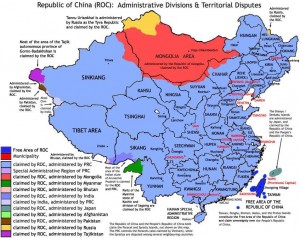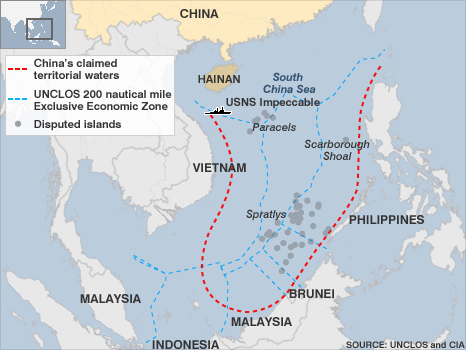Nationalism is a beast the Chinese Communist Party (CCP) did not create, but has often tried harness to it’s benefit. Still, the use of this tool is tempered by the ever present Chinese fear of chaos (luàn:乱). A potential disaster scenario for the party is one in which it finds itself on the wrong side of nationalist fervor, seen as having made China “lose face” before foreign powers, especially Japan or the United States. This potential danger is balanced by the fact it is oft better to keep the Chinese public’s angst focused internationally rather than on the CCP elites in Zhongnanhai, especially over issues of corruption; inflation; and unemployment.
The foundation for current nationalist sentiment often traces back to the humiliation experienced by China over the “unequal treaties” (不平等条约: Bu Ping Deng Tiao Yue) of the 18th and 19th centuries, which were imposed on it by the European Powers and Japan. Many of which forced China to cede territory at the point of a gun. Mainland Chinese also have a special resentment toward Japan for actions committed by the Japanese army during World War II, which they feel have never been properly addressed. These things have fed a continual theme of shared Chinese nationalist indignation in the Zeitgeist of “Greater China“, regardless of what political system the ethnic Han Chinese live under. For these reasons, nothing is more sacred to nationalist then Chinese territorial cohesion.
Although the focus is typically on the Mainland, Chinese nationalism has always played a role in Hong Kong politics and culture, and appears to be on a steady rise since the British returned the enslave to Mainland Chinese control:
“According to a recent survey by the Public Opinion Program at the University of Hong Kong, a 58% of Hong Kongers of Chinese descent now identify themselves as Chinese or Chinese Hong Kong citizens. The number may still be only a bare majority, but it shows significant growth of PRC patriotism — when the annual survey was first conducted in 1997, the year HK reverted to Chinese rule, only 18.6% identified as Chinese nationals.”
Also remember that the KMT (Guómíndǎng: 中国国民党) party, which has largely dominated Taiwan political culture since the 1949 Chinese civil war, until recently, claimed the maximum extent of China’s borders during the Qing Dynasty (1644-1912), which includes Tibet (Xizang), Xinjiang (East Turkestan), and all of Mongolia. Taiwan is somewhat peculiar, for over the last 60 years, Taiwan has been a complex case of competing Han Chinese and indigenous “Taiwanese” (bendi ren: 本地人) nationalist elements.

Today, China has territorial disputes on most all of it’s borders, but there are special hot spots under serious contention (not including Taiwan).
East China Sea:
Senkaku (Diaoyu) Islands: China, Japan, Taiwan
Recently, the Chinese government issued a strong formal protest to the Japanese Embassy in Beijing over the Japanese coast guards detention of a Chinese fishing crew near the disputed archipelago. The Japanese claim the fishing boat collided with their coast guard vessel. As is pro forma, the Chinese government allowed several dozen people to protest in front of the Japanese Embassy to show the “outrage” and “hurt feelings” of the Chinese people. Beijing has also allowed anti-Japanese nationals to vent on domestic message boards (warning translations include vulgarity), boards usually subject to heavy moderation by the Chinese government’s “Golden Shield“. Although Hu Zhengyue, a senior foreign ministry official, demanded the immediate release of the sailors, Japan, and another ministry spokeswoman demanded that Japan stop patrolling the disputed waters around the islands. So far, Japan has balked. In April of this year, a Chinese helicopter came within 90 meters (~270 feet) from a Japanese destroyer patrolling the same area. Although both sides are working on plans for joint natural gas exploitation of the area, neither side wishes to discuss sovereignty claims. If Japan keeps this up, China might dare to unban Jackie Chan’s quasi-nationalist action movie, Shinjuku Incident (only partially joking).
Yellow Sea:
Exclusive Economic Zone/Territorial Waters: China, South Korea, United States
China has also recently gave strong objection to South Korean and American naval exercises off the coast of South Korea, claiming they are a provocation to China. The Chinese military has went even further than civilian authorities, threatening retaliation in a North Korea like-fashion, which is ironic, as the exercises are aimed at North Korea in response to the North’s recent sinking of South Korean naval vessel Cheonan. Something Beijing never completely condemned, although it said it would do so if the evidence implicated North Korea.
Throughout, Chinese official media continuously transmitted denouncements of U.S. actions, sprinkled with vague threats, including the promise to “target” American warships and the eloquent phrase penned by Major General Luo Yuan, “if someone harms me, I must harm them.” A new Cold War seemed to be brewing amidst what many thought was a string of Chinese foreign policy missteps.
As Ralph Cossa pointed out these exercises are not close to internationally recognized Chinese waters:
This will place it about 195 km away from the closest Chinese landmass on the Shandong Peninsula and 280 km from the closest city of any significance, Dalian.
And once again, true to form, China has been amping up the criticism of America in its media as being a provocateur intent on insulting China.

South China Sea:
Coastal Area– disputed by Thailand, Vietnam, the Philippines and China.
Gulf of Tonkin – disputed by China, Vietnam
Paracel Islands – disputed by People’s Republic of China, Republic of China (Taiwan), Vietnam
Spratly Islands – disputed by People’s Republic of China, Republic of China (Taiwan), Malaysia, the Philippines, Vietnam, and Brunei
Twice in the last 20 years, China and Vietnam have exchanged gun fire over the Spratly Island chain, which has resulted in the death of over 70 Vietnamese sailors. China has also forced non-Chinese fishing vessels out of sections of the South China sea that are in dispute and even fined them. China also has a history of pressuring foreign oil companies from doing exploratory work in the area with neighboring nations. At the same time, China has started it’s own exploration of the local seabed for exploitable resources.
Due to it’s proximity and history with China, more than any nation in Southeast Asia, Vietnam has been taking an active stance against Chinese territorial claims in the South China Sea. Vietnam has even been involved in violent military conflict over this issue, where they have been on the losing side. Lately, Hanoi has been trying to internationalize the issue, in order to even the playing field. It seems that Vietnam’s prayers have been answered by the United States. The View from Taiwan blog has done an excellent write-up on this, but as stated before, take it with “a grain of salt”, as the blog is clear about it’s anti-Mainland China bias. The U.S. not only took an indirect shot at China, but recent military exercises in the region and criticism of China’s allies North Korea and Myanmar has given a clear signal that the U.S. will continue to be actively engaged in the region, something the Obama administration promised last year.
The administration’s decision to get involved appeared to catch China flat-footed and angered its foreign minister, Yang Jiechi, at a time when the country is already on edge over naval exercises the United States and South Korea will hold off the Korean Peninsula.
Twelve of the 27 countries at the security meeting spoke out in favor of a new approach to the South China Sea, prompting Mr. Yang to observe that the American effort seemed orchestrated.
International concern has been deepening about China’s maritime ambitions, which have expanded with its economic and military muscle. China raised tensions with Vietnam this year with plans to develop tourism in one of the island groups, the Parcels, which the two nations fought over in 1974 before China assumed full control. They had another lethal clash in 1988 over the Spratly island group.
In recent months, administration officials said, China has harassed fishing boats and leaned on energy companies that have tried to make offshore deals with other countries.
The Chinese government considers all of these areas now under the category of “core national interest” and will certainly be ongoing areas of conflict.
Update: Japan has freed the 14 Chinese prisoners it was holding.